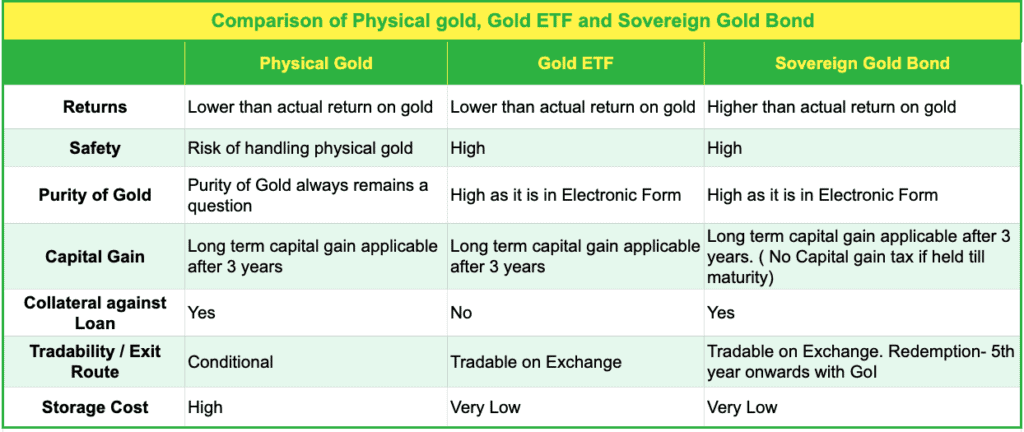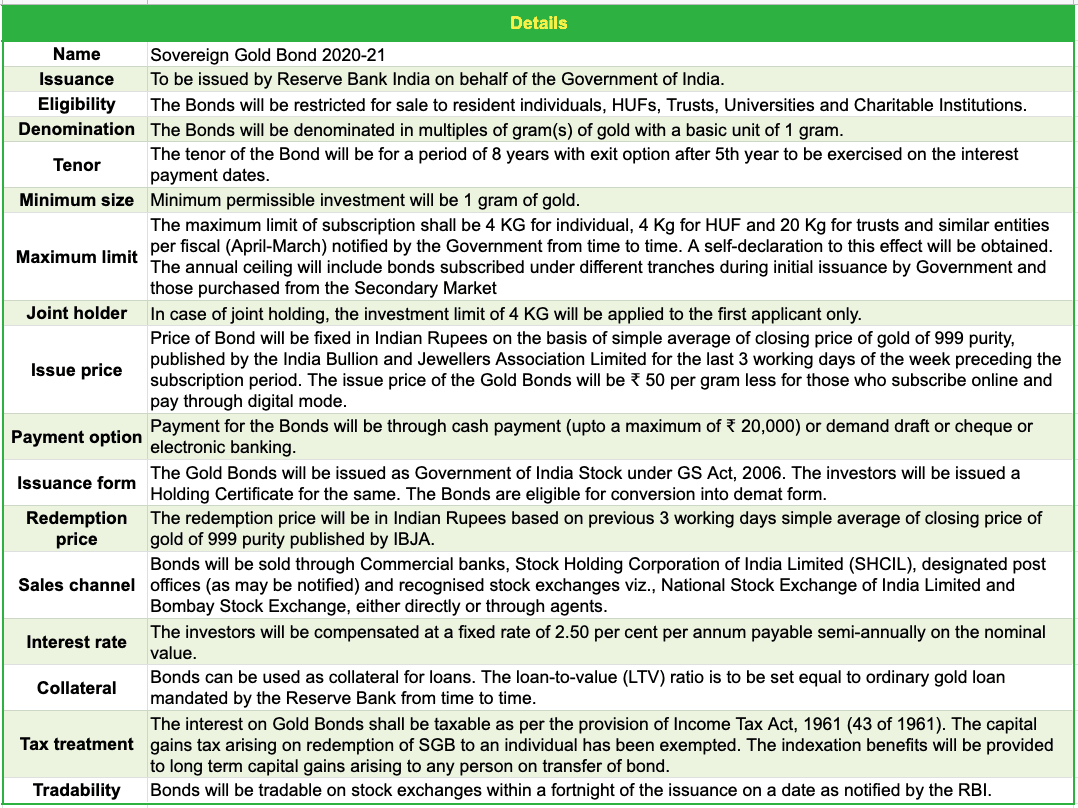Are you planning to invest in Gold to diversify your portfolio?
Then probably you have heard about Sovereign Gold Bond scheme.
Today, we are going to discuss everything you need to know about the SGB.
So let’s start this journey together.
Learn How to invest in Gold in India
Page Contents
What are Sovereign Gold Bonds?
Sovereign Gold Bond Scheme was launched by the Government of India in November 2015, under Gold Monetisation Scheme
Sovereign Gold Bonds are tradable government securities with prices linked to the value of the underlying asset gold.
SGB are issued by the Reserve Bank of India on behalf of the government.
The bond issue is priced at the average closing price of gold of 999 purity published by the India Bullion and Jewellers association—in the last three working days of the week preceding the subscription.
Under the scheme, the issues are made open for subscription in tranches.
RBI Notifies the terms and conditions for the scheme from time to time.
The rate of SGB will be declared by RBI before every new tranche by issuing a Press Release.
Sovereign Gold Bond Upcoming Issues
The details of the scheme for subscription period April 2020 to September 2020 are as per the calendar mentioned below*:
| Tranche | Date of Subscription | Date of Issuance |
|---|---|---|
| 2020-21 Series II | May 11 to May 15 , 2020 | 19-May-20 |
| 2020-21 Series III | June 08 to June 12, 2020 | 16-Jun-20 |
| 2020-21 Series IV | July 06 to July 10, 2020 | 14-Jul-20 |
| 2020-21 Series V | August 03 to August 07, 2020 | 11-Aug-20 |
| 2020-21 Series VI | August 31 to September 04, 2020 | 8-Sep-20 |
Why should you invest in Gold Bonds?
If you want to diversify your portfolio and want to invest in gold then SGB is the best option for you.
With the government of India’s Sovereign Gold Bonds scheme, you can earn an assured interest rate eliminating risk and cost of storage.
The tenor is eight years but it offers an exit option after the fifth year—available on the day of interest payment.

How to invest in Sovereign Gold Bonds?
Investing in Sovereign Gold Bonds is much more easy and convenient now.
Investors can apply for the bond through bank branches, post offices, stock exchanges or through SHCIL (Stock Holding Corporation of India Ltd) by filling up an application form.
An online application can be made through the websites of scheduled banks. PAN is a compulsory document here.
You can choose to take physical delivery of the bonds or online in one’s Demat account.
Payment for the Bonds will be through cash payment (up to a maximum of Rs. 20,000/-) or demand draft or cheque or electronic banking.
The investors will be issued a Holding Certificate for the same. The Bonds are eligible for conversion into Demat form.
Eligibility for Sovereign Gold Bond Scheme
Gold bonds are restricted for sale to resident Indian entities including individuals, HUFs, trusts, universities and charitable institutions.
Also, the online mode of investment in gold bonds may not be available to all categories of investors.
As per RBI instructions “Every application must be accompanied by the ‘PAN Number’ issued by the Income Tax Department to the investor(s)’’ as the PAN number of the first/ sole applicant is mandatory.
Features and Benefits of Sovereign Gold Bond Scheme
- Sovereign Guarantee: It is issued by Reserve Bank India on behalf of the Government of India.
- Safe: Zero risks of handling physical gold
- Earn Interest: 2.50% assured interest per annum on the issue price
- Tax Benefits: Exempt from the Capital gains tax, if held till maturity
- Assurance of Purity: Gold bond prices are linked to the price of gold of 999 purity (24 carats) published by IBJA.
- Easy Exit Option: The tenor of the bond is for 8 years with an option to redeem from the 5th year onwards on the date on which interest is payable
- Transferability: Bonds shall be transferable by the execution of an Instrument of transfer following the provisions of the Government Securities Act.
- Tradability: You can Trade SGB on Stock Exchanges
- Ease of Borrowing Loan: Bonds can be used as collateral for loans.
- Minimum Investment: You can invest in as low as 1 gram of gold.
- Convenience: Convenience of investing online
Interest rate of Sovereign Gold Bond Scheme
SGB bonds also offer an interest of 2.5 percent annually, paid semi-annually.
The interest payments will be made on the face value.
Maturity Period of Sovereign Gold Bond Scheme
The tenor of the SGB is for 8 years with an option to redeem from the 5th year onwards on the date on which interest is payable.
You can also trade the SGB on Stock Exchanges.
The risk associated with Sovereign Gold Bonds
A major risk associated with sovereign gold bonds is that if the price of gold goes down, the price of the bonds also goes down.
You will still get interest on the amount you invested.
Tax Benefits of Sovereign Gold Bond Scheme
Interest received on the gold bonds will be subject to tax as per the provisions of the Income-tax Act, 1961. However, capital gains tax arising on redemption to an individual has been exempted.
Want to Save tax? Then Checkout: How To Save Income Tax on Salary in India (2020)
Price of Sovereign Gold Bond
The bond issue is priced at the average closing price of gold of 999 purity published by the India Bullion and Jewellers Association(IBJA) in the last three working days of the week preceding the subscription.

Points to note
- RBI offers a discount for online applicants.
- This investment can also be made in the name of a minor by a legal guardian.
Conclusion:
So if you are planning to invest in gold, I advise you to go for the sovereign gold bond scheme.
It is safe, hassle-free and gives you more benefits.
You can also gift this bond to your friends and family, as long as they satisfy the eligibility criteria.
You can even invest in an SGB on behalf of your child, so your child can reap the benefits.
If You Have any Question Checkout The FAQ Section Below.
If You Still Need any Help Then Let me Know in Comments.
FAQs About Sovereign Gold Bond Scheme
-
What is Sovereign Gold Bond (SGB)? Who is the issuer?
SGBs are government securities denominated in grams of gold. They are substitutes for holding physical gold. Investors have to pay the issue price in cash and the bonds will be redeemed in cash on maturity. The Bond is issued by Reserve Bank on behalf of Government of India.
-
Why should I buy SGB rather than physical gold? What are the benefits of Sovereign Gold Bond?
The quantity of gold for which the investor pays is protected since he receives the ongoing market price at the time of redemption/ premature redemption. The SGB offers a superior alternative to holding gold in physical form. The risks and costs of storage are eliminated. Investors are assured of the market value of gold at the time of maturity and periodical interest. SGB is free from issues like making charges and purity in the case of gold in jewellery form. The bonds are held in the books of the RBI or in Demat form eliminating the risk of loss of scrip etc.
-
Are there any risks in investing in SGBs?
There may be a risk of capital loss if the market price of gold declines. However, the investor does not lose in terms of the units of gold which he has paid for.
-
Who is eligible to invest in the SGBs?
A person resident in India as defined under the Foreign Exchange Management Act, 1999 are eligible to invest in SGB. Eligible investors include individuals, HUFs, trusts, universities and charitable institutions. Individual investors with subsequent change in residential status from resident to non-resident may continue to hold SGB till early redemption/maturity.
-
Whether joint holding will be allowed?
Yes, joint holding is allowed.
-
Can a Minor invest in SGB?
Yes. The application on behalf of the minor has to be made by his/her guardian.
-
Where can investors get the application form?
The application form will be provided by the issuing banks/SHCIL offices/designated Post Offices/agents. It can also be downloaded from the RBI’s website. Banks may also provide online application facility.
-
What are the Know-Your-Customer (KYC) norms?
Every application must be accompanied by the ‘PAN Number’ issued by the Income Tax Department to the investor(s).
-
Can an investor hold more than one investor ID for subscribing to the Sovereign Gold Bond?
No. An investor can have only one unique investor Id linked to any of the prescribed identification documents. The unique investor ID is to be used for all the subsequent investments in the scheme. For holding securities in dematerialized form, quoting of PAN in the application form is mandatory.
-
What are the minimum and maximum limit for investment?
The Bonds are issued in denominations of one gram of gold and in multiples thereof. The minimum investment in the Bond shall be one gram with a maximum limit of subscription of 4 kg for individuals, 4 kg for Hindu Undivided Family (HUF) and 20 kg for trusts and similar entities notified by the government from time to time per fiscal year (April – March). In case of joint holding, the limit applies to the first applicant. The annual ceiling will include bonds subscribed under different tranches during initial issuance by Government and those purchased from the secondary market. The ceiling on investment will not include the holdings as collateral by banks and other Financial Institutions
-
Can each member of my family buy 4Kg in their own name?
Yes, each family member can buy the bonds in his/her own name if they satisfy the eligibility criteria as defined at Q No.4.
-
Can an investor/trust buy 4 Kg/20 Kg worth of SGB every year?
Yes. An investor/trust can buy 4 Kg/20 Kg worth of gold every year as the ceiling has been fixed on a fiscal year (April-March) basis.
-
Is the maximum limit of 4 Kg applicable in case of joint holding?
The maximum limit will apply to the first applicant in case of a joint holding for that specific application.
-
What is the rate of interest and how will the interest be paid?
The Bonds bear interest at the rate of 2.50 per cent (fixed rate) per annum on the amount of initial investment. Interest will be credited semi-annually to the bank account of the investor and the last interest will be payable on maturity along with the principal.
-
Who are the authorized agencies selling the SGBs?
Bonds are sold through offices or branches of Nationalised Banks, Scheduled Private Banks, Scheduled Foreign Banks, designated Post Offices, Stock Holding Corporation of India Ltd. (SHCIL) and the authorised stock exchanges either directly or through their agents.
-
Is there any risk involved in investing in SGB?
Yes, there might be a risk of capital loss when the market rate of gold goes down. But, it does not affect an investor’s units of gold for which he/she has paid.
-
Can I take a loan against Sovereign Gold Bonds?
Yes, you can take a loan by using these bonds as securities. These bonds can be used as collaterals at banks, financial institutions and other non-banking financial companies.
-
Can Sovereign Gold Bonds be traded?
Yes, Sovereign Gold Bonds are tradable on stock exchanges as per the RBI notification.
-
Can I sell or transfer Sovereign Gold Bonds purchased by me?
Yes, you can sell or transfer your bonds as per provisions of the Government Securities Act.
-
If I apply, am I assured of allotment?
If the customer meets the eligibility criteria, produces a valid identification document and remits the application money on time, he/she will receive the allotment.
-
When will the customers be issued Holding Certificate?
The customers will be issued Certificate of Holding on the date of issuance of the SGB. Certificate of Holding can be collected from the issuing banks/SHCIL offices/Post Offices/Designated stock exchanges/agents or obtained directly from RBI on email if an email address is provided in the application form.
-
Can I apply online?
Yes. A customer can apply online through the website of the listed scheduled commercial banks. The issue price of the Gold Bonds will be ₹ 50 per gram less than the nominal value to those investors applying online and the payment against the application is made through digital mode.
-
At what price the bonds are sold?
The nominal value of Gold Bonds shall be in Indian Rupees fixed on the basis of simple average of the closing price of gold of 999 purity, published by the India Bullion and Jewelers Association Limited, for the last 3 business days of the week preceding the subscription period.
-
Will RBI publish the rate of gold applicable every day?
The price of gold for the relevant tranche will be published on RBI website two days before the issue opens.
-
What will I get on redemption?
On maturity, the Gold Bonds shall be redeemed in Indian Rupees and the redemption price shall be based on a simple average of the closing price of gold of 999 purity of previous 3 business days from the date of repayment, published by the India Bullion and Jewelers Association Limited.
-
How will I get the redemption amount?
Both interest and redemption proceeds will be credited to the bank account furnished by the customer at the time of buying the bond.
-
What are the procedures involved during redemption?
The investor will be advised one month before maturity regarding the ensuing maturity of the bond.u003cbru003eOn the date of maturity, the maturity proceeds will be credited to the bank account as per the details on record.u003cbru003eIn case there are changes in any details, such as account number, email ids, then the investor must intimate the bank/SHCIL/PO promptly.
-
Can I encash the bond anytime I want? Is premature redemption allowed?
Though the tenor of the bond is 8 years, early encashment/redemption of the bond is allowed after the fifth year from the date of issue on coupon payment dates. The bond will be tradable on Exchanges if held in Demat form. It can also be transferred to any other eligible investor.
-
What do I have to do if I want to exit my investment?
In case of premature redemption, investors can approach the concerned bank/SHCIL offices/Post Office/agent thirty days before the coupon payment date. Request for premature redemption can only be entertained if the investor approaches the concerned bank/post office at least one day before the coupon payment date. The proceeds will be credited to the customer’s bank account provided at the time of applying for the bond.
-
Can I gift the bonds to a relative or friend on some occasion?
The bond can be gifted/transferable to a relative/friend/anybody who fulfils the eligibility criteria (as mentioned at Q.no. 4). The Bonds shall be transferable in accordance with the provisions of the Government Securities Act 2006 and the Government Securities Regulations 2007 before maturity by the execution of an instrument of transfer which is available with the issuing agents.
-
What are the tax implications on i) interest and ii) capital gain?
Interest on the Bonds will be taxable as per the provisions of the Income-tax Act, 1961 (43 of 1961). The capital gains tax arising on redemption of SGB to an individual has been exempted. The indexation benefits will be provided to long terms capital gains arising to any person on transfer of bond.
-
Is tax deducted at source (TDS) applicable on the bond?
TDS is not applicable on the bond. However, it is the responsibility of the bondholder to comply with the tax laws.
-
Who will provide other customer services to the investors after issuance of the bonds?
The issuing banks/SHCIL offices/Post Offices/Designated stock exchanges/agents through which these securities have been purchased will provide other customer services such as change of address, early redemption, nomination, grievance redressal, transfer applications etc.
-
What are the payment options for investing in the Sovereign Gold Bonds?
Payment can be made through cash (up to ₹ 20000)/cheques/demand draft/electronic fund transfer.
-
Whether the nomination facility is available for these investments?
Yes, nomination facility is available as per the provisions of the Government Securities Act 2006 and Government Securities Regulations, 2007. A nomination form is available along with Application form. An individual Non – resident Indian may get the security transferred in his name on account of his being a nominee of a deceased investor provided that:u003cbru003ethe Non-Resident investor shall need to hold the security till early redemption or till maturity, andu003cbru003ethe interest and maturity proceeds of the investment shall not be repatriable.
-
Can I get the bonds in Demat form?
Yes. The bonds can be held in Demat account. A specific request for the same must be made in the application form itself.u003cbru003eTill the process of dematerialization is completed, the bonds will be held in RBI’s books. The facility for conversion to Demat will also be available after to allotment of the bond.
-
What is the procedure to be followed in the eventuality of death of an investor?
The nominee/nominees to the bond may approach the respective Receiving Office with their claim. The claim of the nominee/nominees will be recognized in terms of the provision of the Government Securities Act, 2006 read with Chapter III of Government Securities Regulation, 2007. In the absence of nomination, claim of the executors or administrators of the deceased holder or claim of the holder of the succession certificate (issued under Part X of Indian Succession Act) may be submitted to the Receiving Offices/Depository. It may be noted that the above provisions are applicable in the case of a deceased minor investor also. The title of the bond in such cases too will pass to the person fulfilling the criteria laid down in Government Securities Act, 2006 and not necessarily to the Natural Guardian.
-
Can I get part repayment of these bonds at the time of exercising put option?
Yes, part holdings can be redeemed in multiples of one gm.
-
How do I contact RBI to address my queries regarding Sovereign Gold Bond?
A dedicated e-mail has been created by the Reserve Bank of India to receive queries from members of public on Sovereign Gold Bonds. Investors can mail their queries to this email id.u003cbru003eMaximum /minimum amount of investments under the Sovereign Gold Bond Schemeu003cbru003eSovereign Gold Bonds are issued in denominations of 1 gram of gold and multiples of it. The gold scheme accepts a minimum investment of 2 gm and a maximum investment of 500 gm form a single person in a fiscal year.
-
Is Sovereign Gold Bond Interest Tax-Free?
No, Interest on the SGB will be taxable as per the provisions of the Income-tax Act, 1961 (43 of 1961). However, capital gains tax arising on redemption to an individual has been exempted.
-
Can I Buy SGB without Demat Account?
Yes, You Can Buy SGB Without Demat account by Visiting any Bank or Post Offices.



